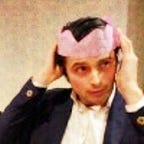Other Womaning
Lorrie Moore’s How to Be an Other Woman, from her collection Self-Help is a instructive-styled short story in which the protagonist struggles with becoming the role. While it seems that it is easy enough to do — fall in love with a stranger who seems in control of their world, discover afterwards that you have become an other woman, the filling out of the role personally requires some kind of magical thinking about the self.
All versions of an Other Woman in the story are built out of the idea of the canonical wife — all aspects of an Other Woman must live partly off this reflection. After all, she cannot be as such without the wife.
This identity by reflection comes from the protagonist constantly punning away from the central language of her counterpart. When she discovers that the wife of the man she is seeing makes lists, and that this is something he likes about her, she begins producing them as part of her narrative identity as an other woman:
Our protagonist is constantly punning — changing herself into objects or pushing words and phrases around so they slip from one thing to another. Flipping secretary to sedentary. Jokes about waking up with a jerk.
She refers to herself as a “ridiculous cake” when describing how she is made up to go to bed on the chance that he might arrive. She turned herself into objects often to make the self less real. She has to develop the idea by trying out the reality — I suppose here being The Woman — and then slipping it and flipping it into another shape that seems more appropriate to what she believes she is becoming.
Later in the story when she realises she is not the other woman at all, merely one of the other women that he is building this life around, the taste of it all is tarnished. This makes her entire conceit pointless, and she returns to a world where her otherness is an instructive expression of failure to the women around her — having a good education but an average job, a distance from others, a desire to be plucked out because of her university associations.
In both cases, she is searching for a way to exist that validates herself as a separate entity from hat can clumsily be called the normal world. She reflects on her body through language and separation from the normal things she sees around her. She is searching for some kind of way out, a narrative that satisfies her own existing self through her actions, and one that doesn’t have to belong to the world of women she is surrounded by, or cast against.
This is the weekend of that wedding where I’m reading a thing, hopefully. You can read all about the Carol Ann Duffy poem I am reading this this back issue of ETTO.
This week’s song is something dredged up by grabbing CD’s before a car journey without looking at them properly. As such we have another Bright Eyes song, which is nearly timed correctly: June on the West Coast.
Thanks for reading Etch To Their Own. It was written by me, @CJEggett, and proofread by no one. You can sign up for it here, and it will come to your inbox. A lot of people I love are having exciting or difficult times all at once, so I am very stretched out — this isn’t a complaint, just a statement of thinness. I’ve been kindly given the opportunity to help out with some literary projects, which I will update you with some time soon.
